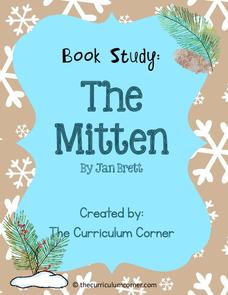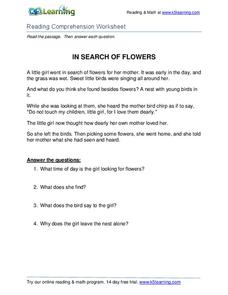Teaching Children Philosophy
Tiger-Tiger, is it True?
Scholars take part in a philosophical discussion about truth, thoughts, and feelings following a reading of Tiger-Tiger is it True? by Byron Katie and Hans Wilhelm.
Johnson County Community College
Treasured Stories by Eric Carle
Explore the works of Eric Carle with a set of four lessons focused around the stories, Brown Bear, Brown Bear, What Do You See?, Papa, Please Get the Moon For Me, and The Very Hungry Caterpillar. Young readers develop a storyboard,...
Montclair Art Museum
Eric Carle: Animals and Friends
Celebrate Eric Carle’s beloved children’s books, especially those about animals. Teachers and readers alike engage in Carle’s books as they explore the art and color in each of his stories, and how these elements support comprehension.
West Corporation
Making Inferences – Use Your Mind to Read!
How can you tell if someone is happy? The lesson works with elementary and middle school scholars to activate their schema and pay attention to details to make inferences in their daily lives, poetry, and other literature. Cleverly...
Mr. Mansour
Ralph S. Mouse by Beverly Cleary
Take an in-depth look into Beverly Cleary's story, Ralph S. Mouse, with a 10-question worksheet that focuses on story elements. Scholars describe the main character, point of view, conflict resolution, and more! Then, conclude with...
National Council of Teachers of English
A Bear of a Poem: Composing and Performing Found Poetry
Scholars work collaboratively to compose a found poem from one of their favorite stories. With a finished product in hand, class members form a circle and perform their work for an audience by taking turns reciting one line till the poem...
Gerald R. Ford Presidential Library & Museum
Benjamin Franklin: In Search of a Better World
Of the many roles he played, Benjamin Franklin most wanted to be remembered as B. Franklin, Printer. Learners of all ages find out more about this amazing man through the activities included in the Benjamin Franklin Tercentenary Guide....
Curriculum Corner
Fairy Tale Unit of Study
What makes a fairy tale a fairy tale? Use a 27-page packet to supplement your next fairy tale unit. With sequencing activities, story map worksheets, character analyses and story elements graphic organizers, and fairy tale highlight...
Curriculum Corner
Book Study: The Mitten
Looking for a set of resources to compliment a reading of The Mitten by Jan Brett? A fun winter resource has everything from story sequencing and writing prompts to a parts of speech sort and a mitten flap book. The activities are great...
Curriculum Corner
Book Study: The Polar Express
All aboard! Pair a reading of The Polar Express by Chris Van Allsburg with a set of literacy activities. The packet of worksheets includes task cards, sorting activities, a synonym match, comparing and contrasting activities, writing...
Curated OER
Fairy Tales
Once upon a time are four words most children are familiar with when reading a fairy tale. But do they know that fairy tales are a great way to learn the literary elements of reading and writing? Use a thorough fairy tale unit...
Curriculum Corner
Quick Literacy Centers for Back to School
Use a set of quick and easy to use literacy centers at the beginning of the year as you start to assess your students. The 13-page packet provides writing and reading activities with simple directions that allows new class members...
K5 Learning
In Search of Flowers
There's no love like a mother's adoration for her children. Second graders read a short story about a little girl's discovery of baby birds and their mother before answering four comprehension questions.
K5 Learning
A Big, White Hen
Why wouldn't the chickens cross the brook? Find out in a short reading passage about a mother hen and her babies' daily walk. Second graders answer four comprehension questions after they finish reading the story.
K5 Learning
The Coat
The moral of the story: listen to your parents! A concise reading passage introduces learners to Tom and the consequences of his choice to go out without a coat.
K5 Learning
Race Cars
Do you ever get nervous before a big event? A pair of race cars discuss their nerves before tomorrow's race in a reading activity that includes five comprehension questions.
K5 Learning
Hide and Seek
Hide and seek is a lot of fun whether you're the hider or the seeker! Second graders read a short passage about a game of hide and seek before answering four reading questions.
K5 Learning
Moving On
Read about Daniel Boone and his early years in a new land in Yadkin County, North Carolina. After reading, pupils respond to four comprehension questions that address the how and the why.
K5 Learning
John and Rick Do Not Like Rats
What would you do if you saw a rat? A short reading passage explains what John and Rick do when they see a rat, as well as what they do when it tries to escape.
K5 Learning
Pretty Fish
John caught a trout, but will he release it or eat it? After reading the passage, young readers respond to four comprehension questions about the story.
K5 Learning
Ten Little Cookies
First there were ten cookies and then there were none. Who ate all the cookies? After reading a short poem that counts down from 10 as cookies are eaten, class members respond to four comprehsnion questions.
K5 Learning
The Bomb
Second graders read a brief passage about King Charles XII of Sweden who lived over 200 years ago. Then, they respond to four short answer questions about what they read.
K5 Learning
Playground
Bella and Molly at spending time at the playground, but encounter a problem. Read about their problem and how each of them works together to solve it. Then, readers answer five questions about what they read in the passage.
K5 Learning
Here Is A Nest
Answer the what, the how, and the why in a reading passage about a hen and her chicks. Readers use the text as a basis for finding the exact answers within the passage.

























